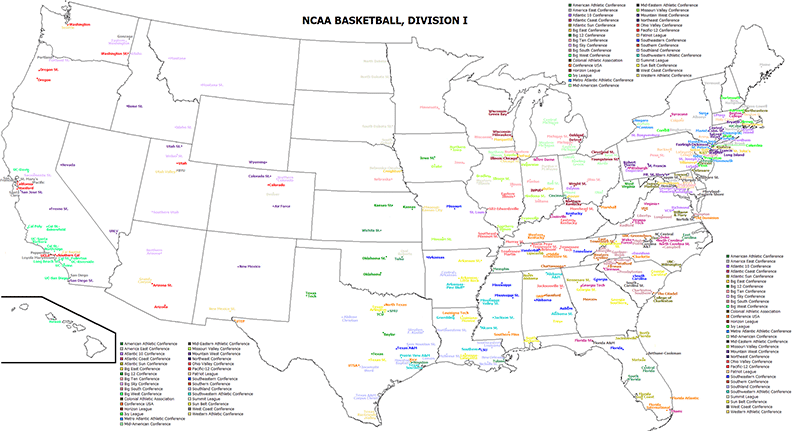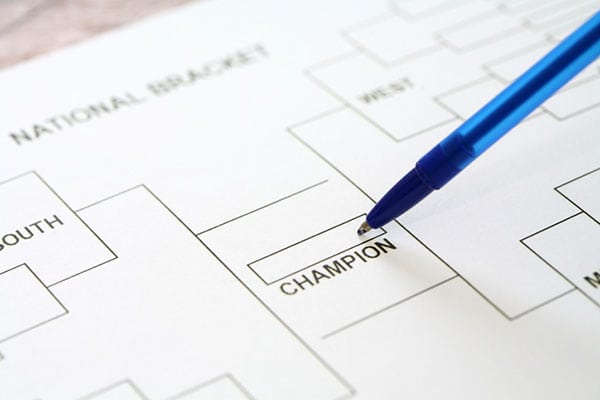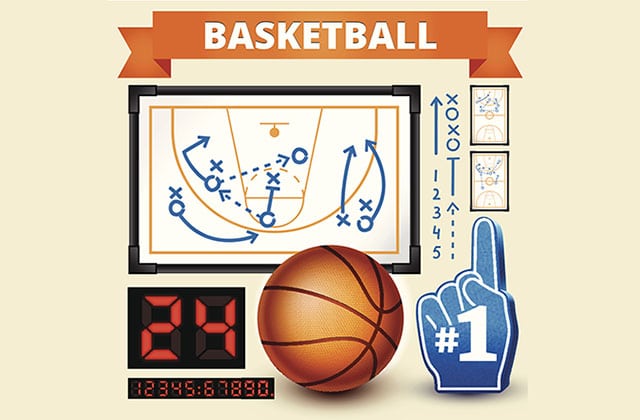Can someone please explain March Madness to me?
As many international students in the United States have experienced, something strange happens this time of year. A peculiar mania known as March Madness descends on college campuses. Could it be the pressure of midterm exams, assignments or papers that are coming due? Or is it the buildup to a U.S. collegiate tradition: spring break (typically a week’s vacation in the middle of the semester at U.S. colleges)?
Students who attend many of the 350+ NCAA (National Collegiate Athletic Association) Division I colleges or universities that have basketball teams (see image below) are hoping that on Selection Sunday March 11, 2018, they will hear their college’s name announced. On this day, a committee of athletic directors from these colleges select the 68 best men’s and 68 best women’s teams to compete in the annual top-level national college basketball tournaments.

Define March Madness
When asked to explain why this tournament is madness, Song Lin, a first-year undergraduate business student from China who attends the University of South Carolina, shares that “if you win, you can continue to the next game, but if you lose the game, go home!” Unlike the NBA (National Basketball Association) playoffs, where teams play a best-of-five or best-of-seven game series to decide who advances, this college basketball tournament gives no second chances. As a result, the pressure to win is intense. Each year teams that have earned outstanding records after playing 30+ games enter March Madness as favorites. Yet even those great teams can get upset and lose in an early round. And just like that, their seasons are over.
Some international students know a few top NBA players like Steph Curry from the Golden State Warriors or LeBron James of the Cleveland Cavaliers, but they might struggle to name a college basketball player. However, students who played or watched basketball before coming to the United States might factor in a college’s basketball success when choosing which school to attend. As Song Lin mentions, “I knew our men’s basketball team made the Final Four, and our women’s team ranked first in the NCAA tournament last year.”
What compares to the excitement and celebrations that happen during March Madness? When asked whether there is anything like this tournament in his home country, Yinxian Wang, a chemical engineering junior from China who attends the University of Kansas (KU), remarks that “March Madness is similar to Chinese Lunar New Year (the most important festival in Chinese culture) for basketball fans.”
What Is Bracketology?
From the First Four to the Sweet Sixteen, Elite Eight and the Final Four, students on campus and people around the country predict which team will win it all. One fun way to get involved with the spirit of March Madness is to fill out a bracket showing all 68 teams and pick winners for each game (see image below). Students might enter different brackets in four, five or more different competitions around campus or online with ESPN or other free bracket prediction sites.

Campus Craziness
An easy way for students to be involved in the events surrounding March Madness is to play basketball themselves. When Song and some friends went to the campus recreation center to play basketball, they “made a lot of [American] friends.” For those who are not willing or able to play, going to home basketball games, learning the college’s fight song, and participating in various campus traditions surrounding the team’s season are easy ways to get involved.
In addition to the March Madness bracket challenges that different groups have around campus, students can participate in other ways. Peihan Ni, a master’s degree student from China at KU, shares that he is surprised to see how many students proudly wear t-shirts with their university mascot — the Jayhawk. Another must for students who cannot physically go to games is to attend parties where basketball games are shown on TV. Yinxian notices “a lot of people change their Facebook avatar to the school they support” for the tournament.
Depending on when and where the games occur in March, groups of students arrange road trips to one or more of the games. For example, if Kansas is selected as the #1 seed in the West Region, they would play their first- and second-round games in Wichita, less than three hours away by car. This would be almost a home game for KU, a big advantage.
Contagious or Simply Silliness?
One thing is clear, if students like basketball before coming to a college campus, they will find it hard not to catch the madness of March college basketball. For Song, Yinxian and Peihan, their answer is the same: they are most definitely college basketball fanatics now. The thrill of the buildup to the tournament games in March wakes even the sleepiest college student from his or her mid-semester slumber. The atmosphere on campus, the buzz in the air on the day of a big game and the thrill after a win are amazing. No matter what the odds of winning a game are, for Yinxian, “every KU game is a must to watch!”
As to which team will win it all this year, most students believe that their university will go all the way to the national championship game, but the reality is never so simple. In the end, every team is looking for their one shining moment during the tournament. To be certain, there will be heartbreak, tears, incredible highs and unbelievable lows. But the emotions of every game-winning shot and defensive stop, each win and loss produce memories that last a lifetime. Enjoy those moments.
